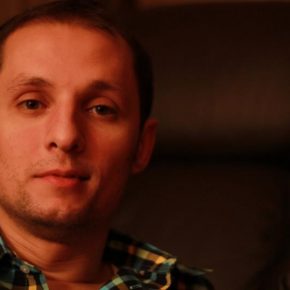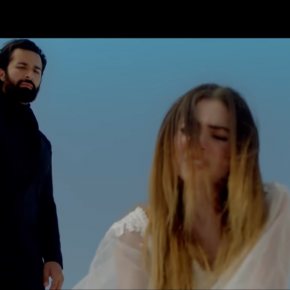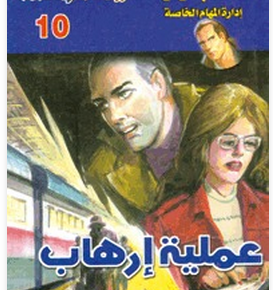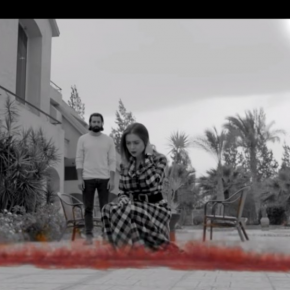Invisible Ghosts from a Scriptwriter’s Present
Mohamed Solaiman Abdelmalek on Plot Twists, Echo Boomers and Naguib Mahfouz
We need to talk about Ramadan and TV land
Ramadan season is usually the main course for filmmakers, scriptwriters and actors. The biggest production companies in the business fight for time slots, optimal screen time and stars face the greatest exposure to the largest number of audiences. The key gameplayer in Ramadan TV series season is Egypt; however, Arab countries such as Syria, Lebanon and Kuwait make notable contribution to the TV-sphere. Despite that, Arab stars strive to appear in one or two Egyptian TV series. Most of them consider the Egyptian audience to be the major target which they intend to seek exposure to.
Why the long intro? My guest today is a prolific writer; one whose life -apart from the job- has been a series of long-term travels and escapades in the murky waters of writing. He started since he was studying medicine in college by writing series of thriller/suspense YA fiction novels. His aim was to explore himself as a scriptwriter and provoke the sense of security and normalcy that most Arab audiences seek. By writing a historical fantasy series of novel rooted in Pharaonic Egypt, he made his landmark as a literary writer, branching out to writing for TV and enjoying the medium with all the limitations and astrophysical lack of sophistication that it provides.
Mohamed Solaiman Abdelmalek the Illusionist
Enter Mohamed Solaiman Abdelmalek. The 39-year-old still looks like a 22-year-old protégé, so it was not a surprise when he spoke of how his appearance and his young age of 19 might have affected his opportunity to publish his debut series of novels which took place in no other than Pharaonic Egypt and centered around a special force who undertook specialized missions to find stolen artifacts, crack secret codes and fall in love along the way; forming a love trio of a dreamy artist -Moheb- a brooding macho with a heart of gold -Hoor- and a sultry female -Nefro- doctor with a secret agenda of her own. Abdelmalek’s series boomed one after the other; in a modern-day suspense thriller titled “Mister Seen – Mr. S”, a tomboy journalist is sought by an unidentified person named Mr. S who helps her solve crimes while also uncovering secrets about her own past.
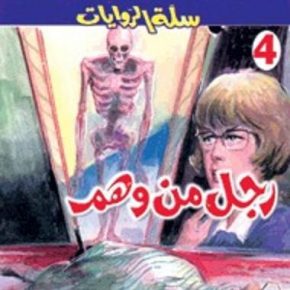
(Mister Seen book series by Mohamed Solaiman Abdelmalek, first issue titled “Born from Illusion”, book cover by Ismail Diab)
Being the daredevil in the multiverses which he explored as opposed to the composed, tactical man I interviewed, Abdelmalek resumed the habit of creating and burning his worlds down on the characters’ -and from beyond the 4th wall- as well as the audiences’ heads. He relies that on his infatuation with being a provocateur;
“I do not like easy answers; give or take. I write what I like to see onscreen or read. By nature, I’m bored too easily, if a movie I am watching does not intrigue me in the first 10 minutes, I bail. If I’m unable to be intrigued, I usually zone off. So I always try to put myself in the spectator’s mindset and offer the unexpected.”
Unexpected did he offer indeed!
Although in the business 10 years ago, starting from scratch through sitcom writing workshops and experimenting with low-budget scripts for movies; this year his luck upturned with two key TV series premiering on some of the biggest networks in the Arab verse. Most notably “Rasayel – Messages” which pays homage to his earlier literary works with a regular, Upper Middle Class woman in her thirties experiencing caught in a game of cat-and-mouse with the man whose car she got in an accident with. They both go into a coma; but while she survives his soul remains hanging in purgatory, with the only connection he could make to the real world is her; thus he sends her cryptic messages in hopes that she could make all of his life’s wrongs right.
Rasayel – Signs and Messages a la TV Drama Style
Rasayel boomed this Ramadan season, gaining both critical and public success. Many spoke of the plot twists, the perfect casting choices and dazzling direction and cinematography by the series director Ibrahim Fakhr. Delving deeper into the series, a spectator keen to over-analyze could feel the sense that something different was brewing. It did not need a rocket scientist to figure out that Rasayel was Abdelmalek’s most personal project to date. To which he confirmed;
“I was involved in a car accident at a crossroads in my life. My car hit a truck on a highway during a period in my life where I had to choose between continuing life as a University scholar while working to make a name as a scriptwriter or choosing one road while completely ditching the other. Both roads diverged and at a point I had to choose. When I was involved in that accident and came out completely unharmed although my car was severely damaged; I took the road less traveled. I felt that a message was sent to me from high above to follow my passion; uncertain and dangerous as it is. I quit my University position and committed to being a full-time scriptwriter. By that time I started writing Rasayel. Yet this passion project remained in the drawer of my desk for 8 years, until it finally saw the light with 2 passionate people backing it up; director Ibrahim Fakhr who fell in love with the script as soon as he read it and diva actress Mai Ezz Eldin who was so excited to carry the project on her shoulders; especially since her position as a TV household name would sell the project.”
(Screenshot from “Rasayel” TV series in the photo actor Ahmed Hatem plays the Illusionist Sameh while Egyptian diva actress Mai Ezz Eldin plays the female protagonist Hala)
Personally, did he believe in certain “Rasayel” being sent to him from high above?
Back when he was still in high school, the Godfather of modern Egyptian drama Ossama Anwar Okasha died. Abdelmalek was not even aware of how his future could unravel into the scenarist he has now become, but that did not prevent him from attending the official funeral ceremony at Omar Makram Mosque without knowing anybody there. To this moment, Abdelmalek believes this could have been Rasayel from the late writer persuading him to seek the bumpy scriptwriting road, especially since Okasha’s major TV hit “Arabesque” was one of the reasons Abdelmalek became enamored by the idea of writing for television and creating similar worlds.
Abdelmalek’s Ghosts from Literature to the Small Screen
With most of his earlier literary work and now his latest TV series revolving around themes including, mystery, suspense and thriller; Abdelmalek stated that he disliked being categorized as a thriller/suspense writer only. He believed that categories and genres limit creativity and forced the writer into a corner where he/she is seen from a certain angle which could hinder his/her involvement in work that might expand the writing muscle in an entirely different direction such as romance or comedy. Personally, I thought his romantic storylines were unconditionally impressive; they usually deviated from Egyptian stereotypical emphasis on certain themes or elements. In his earlier work “El Maktab 17 – The 17th Bureau” his main romantic storyline involved the passionate fighter Omar who usually solved the arms-to-arms aspect of the Bureau’s missions and cold-hearted, practical computer wiz Dina Wassef.
In his latest work-to-TV Rasayel, the main male/female relationship was between Hala and the spirit with whom she got involved in the accident Sameh. The relationship remained subtle, asexual and humane, focusing on how human-human interaction could lead to major life changes. When asked about how he developed such a complex texture in his narrative; he simply replied that the medium in which he molded the narrative paved the way for an unusual relationship which could have probably been slightly unaccepted by Egyptian audiences;
“The asexual nature of relationship could be highly attributed to the nature of the story. This person [Sameh] was stuck between life and death in this spiritual purgatory. The nature of the drama helped create a relationship which was not at all materialistic. Hala was not only helping Sameh, but herself through him; this reflects the Sufi theme that I want to implement through their unconventional interaction.”
(The 17th Bureau book series by Mohamed Solaiman Abdelmalek, Issue titled “Mission Terrorism”, book cover by Ismail Diab)
So what’s that theme about?
Abdelmalek poked around plot twists; aiming for interactive viewer experience starting from his TV series “Esm Moa’kat – Temporary Name” in 2013. He admitted that making the protagonist amnesiac helped him as a writer gain more liberty in shifting narrative structures and timeline.
Is the main theme in Rasayel getting the viewer to engage actively with the series? Not according to Abdelmalek who did not simply want to leave clues for spectators but more of a thematic journey to uncover secrets about the characters and themselves in the process. His obsession with a recurring theme of paranoia, corporate dominance, falseness of the idealism on which Generation Y lived off only to be swept off their feet with the moral ambiguity through which Generation Z is coming-of-age.
“I have always enjoyed the idea of the ruptured global bubble of how the world is not at all what it seems. I think I was heavily influenced by films from the late 1990s and early 2000s which founded the premise that to be entertained, there are things that you have to seek yourself, setting foot for how spectatorship engagement should be as we know it nowadays.
In my opinion, my generation suffered a major existential crisis; we were being told a moral Utopia, that turned out to be completely different from the real world actually works; thus our immersion in nostalgic bliss. I write to cherish the idea of discovery; although people normally prefer easy answers and do not like to be provoked, my aim to translate the existential crisis around us through making cracks in this world. I aim at scaring and provoking audiences. TV now mainly targets the generation which has been fooled by the dreamy idea of the January 25th revolution as the means to an end of a country deteriorating without understanding its political, social, or even individual implications.”
Artistic Influences Past, Present and Feminist
As a speculative, well-informed scriptwriter; you might have easily figured out where Abdelmalek’s artistic influences came from; he mentioned -what he called- the psychedelic narrative wave of filmmakers and scriptwriters of the late 1990s-early 2000s such as Charlie Kaufman and Darren Aronofsky who created multi-layered narratives with plot twists and an ominous psychological meta-universe. He did not deny retaining his childhood and teenage fascination with the masters of box-office blockbusters such as Stephen Spielberg and James Cameron. On the literary side, he was more enamored by Latin American literature than the Russian or British genres; more specifically magical realism. He admits to being heavily influenced by Gabriel García Márquez, Isabelle Allende, and Mario Vargas Llosa.
Abdelmalek did not deny how he sold his soul from early on to Naguib Mahfouz; Egyptian Nobel Prize winner, philosopher and veteran writer noting how his writings are unique in that every time you go back and read them, you discover something new. His writings are ageless as if he lived his life through them.
(Screenshot from “Rasayel” TV series in the photo actor Ahmed Hatem plays the Illusionist Sameh while Egyptian diva actress Mai Ezz Eldin plays the female protagonist Hala)
In Rasayel, the main protagonist Hala is a young, veiled, Upper middle class woman in her thirties; which totally defies the norm of male-led TV series becoming centre-stage in the Egyptian TV landscape. Choosing a female protagonist, is another major recurring theme in Abdelmalek’s writings whether literary or scripts. He explained his rationale that he personally preferred reading female-centric narratives. As a rule, he executes what he likes to see or read. (He plays his rules Palahniuk-wise, his answers to my queries like tactfully aimed bullets).
“I unintentionally write with a female protagonist in mind. I think it only comes from being true to yourself. In my case; I love reading female narratives and I dislike art where the females serve as complementary storylines to the main male protagonist. Women are the center of the universe thus, for a storyteller; females are richer than men, drama-wise.”
Abdelmalek might seem like he is flung out of space; creating worlds and destroying them. But his calculated perception of the Egyptian TV landscape could stop you in tracks; is he the manifestation of the rogue, Bohemian artist gone right? Or is he is simply a few steps ahead, living the normal apple pie life while secretly brewing stories in the basement?
“I am organized when it comes to my work but completely chaotic when it comes to my personal life. My motto is ‘You’re Only as Good as Your Last Job’ so I always look for the next best opportunity. That does not make me the best person to repair a leak under the sink, or know where to get someone who knows how to fix it. If you send me to buy something from the supermarket, there’s a 99% chance I’d bring the wrong grocery item.”
The Future – All is Good on the TV Front
Abdelmalek expressed his practical nature in stating that he did not expect to make a “Rasayel” every Ramadan season. Despite the series’ booming success both critically and commercially; he admitted that it would be hard to reciprocate that kind of success with every script he writes;
“Rasayel was a special case in that it was the passion project of its main three keyplayers; Ibrahim Fakhr the director, Mai Ezz Eldin the actress and myself. Fakhr read my script and fell in love with it immediately and he was the one who backed it up while presenting it to Synergy Production Company stating a few demands before we started shooting such as that all 30 episodes should be written and prepared before shooting as well as certain location requirements that he would not give up including exterior beach sets, the scene in the horse stable and shooting on an actual airplane, which would add an extra cost to a rather cost-effective TV production plan.
I’m a realistic dreamer. Rasayel took 8 years to see the light. It has never been an easy project. You cannot do “Rasayel” all the time without succumbing to self-ridicule. If I found a similarly credible future project with minimum risk, I’ll definitely go for it. Other than that I treat all my scripts as assignment-like projects. I try to set a red line for my writing and do not go below it. I like to keep working.”
He also expressed his unbound support for modern TV as a medium, with a sour taste for the cinema in which he had a few successful experiences previously;
“Back then, TV format was limiting. Nowadays I view cinema as a purely commercial medium. Since 2011, TV and cinema have been overlapping. I believe it is becoming even more difficult for a producer to drive people who stream high quality TV on their phones and laptops into buying a ticket to watch a movie on the big screen. Maybe the teenagers would be your main target audience, but as a writer, they are not mine. I target audiences who are striving for better TV content. New Internet streaming TV channels such as Netflix revolutionized TV landscape, nowadays even producing films for direct streaming on the internet. Who knows, maybe the future for the cinema as a medium would be its extinction apart from the festival circuits?”
Watch out for Mohamed Solaiman Abdelmalek, he is an unstoppable force of nature; TV-wise for the moment!

